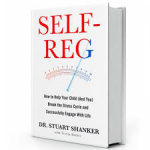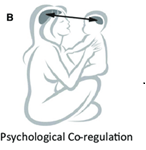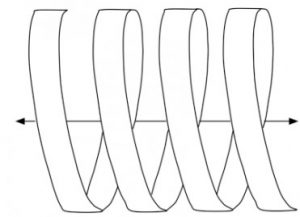Brainwaves is a newsletter designed to create some “brainwaves” within my community of colleagues, friends and clients.
Self-reg…all the rage right now!
Self-regulation seems to be the “rage” right now! Everyone is talking about it in the world of child development … but is it just a fad? Exciting brain research over the past few decades has led to an explosion of information about our brain and behavior. Self-regulation is born from this information. It is here to stay!
Okay, but what does self-regulation mean?
First of all, it is important to understand that self-regulation applies to all of us! …not just children. Adults need to be self-regulated to teach children to be self-regulated!
So, what does it mean? Self-regulation has many definitions but basically it is the ability to recognize the state of our body (eg: calm or tense), understand why we are feeling this way and know how to return to a state of “just right”. Regulated = Just Right for the situation, not too low energy and not too high energy. At work or school, it means feeling that the body and brain are ready to focus or learn. During sports or recess, it means feeling that the body is ready to move and be creative. In team sports, the brain and body is ready to engage and work together.
REMEMBER, children are not born knowing how to self-regulate! So the “self” in “self-regulation” is actually a goal. They first learn how to be regulated by you…the regulated adult. When this happens over and over and over again, a child will eventually learn how to do it for them-“self” (unless there are other biological reasons!)
…happens over and over again… SELF-REGULATION!
The Canadian Connection to Self-regulation?
In Canada, The Mehrit Centre are leading the self-regulation movement. They have marketed the term “self-reg” to promote their approach and they have lots of great graphics, and resources for parents and teachers. www.self-reg.ca
Stress behavior NOT misbehavior!
The first and most important step in learning about self-regulation is understanding that a lot of our behavior (and our children’s) is “stress behavior” and has very little or nothing to do with self-control. We get caught in a “stress loop” and we are not good at recognizing it.
Stress Signals?
not being able to sleep
obsessive worrying
sarcasm, yelling, grouchy comments
being unable to finish things,
having a “heavy body”
being unable to smile
having racing thoughts or a racing body
making decisions too quickly
having accidents
The oldest part of our brain, which helps us survive by detecting danger, reacts to our stress load. If we are “running on empty”, our old brain will use “fight, flight or fright” strategies and we might not even know! …and let’s get one thing straight…this has nothing to do with self-control! In fact, Stuart Shanker claims that having self-regulation is what leads to self-control and not the other way around.
The Problem with a Self-Control Perspective?
 Self-control comes from a behavioral perspective that believes that we must use punishment and reward strategies to mold behaviors. This way of thinking began a century ago and, as Stuart Shanker states in his book “Self-Reg”, “These misguided theories have become entrenched in…child rearing….we have come to realize how harmful this outlook can be.”
Self-control comes from a behavioral perspective that believes that we must use punishment and reward strategies to mold behaviors. This way of thinking began a century ago and, as Stuart Shanker states in his book “Self-Reg”, “These misguided theories have become entrenched in…child rearing….we have come to realize how harmful this outlook can be.”



